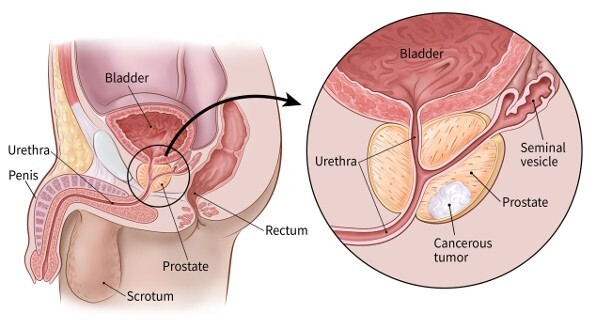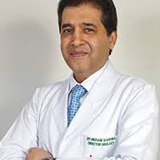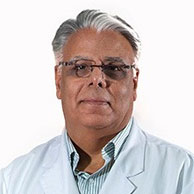Prostate Cancer Treatment Cost In India

The starting cost of Prostate Cancer Surgery in India is around 3500 USD, however, the total cost may vary depending on the specific medical condition and the procedure chosen.
Following the surgery, the patient typically needs to stay in the hospital for 2-3 days, and 14 days of recovery outside the hospital.
Tests that may be required to diagnose Prostate Cancer include Digital Rectal Exam (DRE), Prostate-Specific Antigen (PSA) test, Ultrasound, and MRI Fusion. The costs of these tests are typically not included in the surgery cost and may vary depending on the diagnostic center and location.
Prostate Cancer Treatment In India
Prostate cancer treatment in India is done at best hospitals for prostate cancer treatment in India at an affordable cost. With advancements in technology like a robotic arm for prostate surgery, the success rate for prostate cancer treatment has gone up by many folds. Robotic surgery for prostate cancer allows maximum precision during the surgery making it safest bet for the patients even at old age.
What is Prostate Cancer?
Prostate cancer develops in the prostate gland of men which is located in the private part of men. It looks like walnut from its shape which is covering the entire area of urinal pipe. This cancer mostly happens after the age of 50 but if you want to avoid this cancer then you have to pay attention towards it from young age because it can happen to anyone.
Prostate cancer is the most common type of cancer in men worldwide. Cancer is a condition that develops when cells start to grow uncontrollably outside of cell division and cell death mechanisms. This usually occurs due to changes in cellular DNA.
Most of the People are not aware about this Cancer which only found in male Patients. Facts reveal that About 1 man in 7 will be diagnosed with prostate cancer during his lifetime.
What are the symptoms of prostate cancer?
Symptoms may not appear during the early stages of prostate cancer, and most symptoms of prostate cancer vary from person to person. Having these symptoms does not mean you have prostate cancer.
- Blood In Urine:- The early stage of prostate cancer is blood in the urine. If ever you see blood coming out from your private part then don’t neglect it in fact it is the sign that you might have prostate cancer. It’s the right time to panic because if you will cure it in its early stage then it will not grow more.
- Burning In Urine:– Most of the time, we avoid burning in urine because we take it as a normal disturbance of health which is causing burning in urine. But guys, this is not a normal thing. If you are feeling burning in urine then pay attention to it because it can be the sign of prostate cancer.
- Pain In Urine:– During urine if you feel pain in your private part or you feel a kind of pressure then it is not a normal thing because it can be prostate cancer. So, next time if you feel this kind of feeling then don’t avoid it and consider your doctor regarding this and help yourself out from this cancer.
- Tightness:– Many times, you feel tightness in the lower part of your body because of heavy work or gyming but if you continuously feel any kind of tightness in bones in the lower part of your back like hips or thighs then it means that prostate cancer has attacked you. It’s high time to consider with your doctor.
What are the risk factors for prostate cancer?
Anything that increases your chance of getting prostate cancer is a risk factor. These include:
- Age: This is the most important risk factor. Most men who develop prostate cancer are older than 50. About two of every three prostate cancers are diagnosed in men older than 65.
- Family history: Risk is higher when other members of your family (especially father, brother, son) have or had prostate cancer, especially if they were young when they developed it.
- Race: African-American men have nearly double the risk of prostate cancer as white men. It is found less often in Asian American, Hispanic and American Indian men.
- Diet: A high-fat diet, particularly a diet high in animal fats, may increase risk; diets high in fruits and vegetables may decrease risk.
- Nationality: Prostate cancer is more prevalent in North America and northwestern Europe than other parts of the world.
Some research suggests that inflammation of the prostate (prostatitis) may play a role in prostate cancer. Sexually transmitted diseases (STDs) are being investigated as possible risk factors as well.
How is Prostate Cancer diagnosed?
To diagnose prostate cancer, or to see if cancer has spread, these tests may be performed:
- Digital rectal exam (DRE)
- A prostate-specific antigen (PSA) test that measures the level of PSA in the blood
- Rectal ultrasound
- Biopsy
- MRI
- Transrectal Ultrasound.
What are stages of prostate cancer?

- Stage I: cancer is confined to a small area of the prostate gland and cells are not at all aggressive.
- Stage II: cancer is small but the cancer cells may reflect as aggressive or the cancer is large may have grown enough that is involving prostate glands of both the sides.
- Stage III: cancer has advanced outside the prostate and affecting seminal vesicles and adjacent tissues.
- Stage IV: cancer has advanced to plague nearby organs including urinary bladder, bones, lymph nodes, lungs or other tissues and organs.
Types of Treatment for Prostate Cancer include:
- Treatment for low-risk prostate cancer is often active surveillance. Surgery may be performed to remove a portion of the prostate. Radiation may be suggested for early-stage patients, as surgery and radiation produce similar outcomes.
- Treatment for intermediate-risk prostate cancer generally includes hormone therapy (androgen deprivation) combined with surgery to remove a portion of or the entire prostate, and possibly radiation.
- Treatment for high-risk prostate cancer often includes an emphasis on clinical trials. Hormone therapy and radiation will likely be introduced to the plan, as well. A prostatectomy may be performed, along with the removal of affected tissue or lymph nodes.
- Metastatic prostate cancer treatment often includes immunotherapy and hormone therapies.
- Chemotherapy may be introduced if these therapies aren’t successful. Radiation may be suggested at this stage of the disease to ease pain or symptoms.
- For prostate cancer patients with recurrent prostate cancer, surgery will include prostatectomy and radiation. Hormone therapy is occasionally suggested for recurrent cases, as well.
Watchful waiting.
If you have slow-growing cancer, your doctor may recommend observation as the first phase of treatment. This also might apply to men who are older or have severe health issues. Watchful waiting involves monitoring changes in your symptoms and tumors. It can consist of regular rectal exams, blood tests, and/or biopsies. If your doctor detects changes, they likely will suggest a type of active treatment.
Prostate Cancer Surgery
Surgical treatment of prostate cancer requires the removal of the entire prostate, a procedure called a radical prostatectomy. The entire prostate, seminal vesicles, and some surrounding tissues are removed. This can be done via open/traditional or laparoscopic surgery.
- High Intensity Focused Ultrasound– Commonly known as HIFU, which employs high frequency energy to heat and flush out the cancer cells found in the prostate gland.
- Robotic Surgery – This is among the advanced techniques, which is known for the high precision in carrying out the surgery.
- Cyber Knife Treatment – this surgery also deals with radiation that helps in fixing the prostate cancer.
- Laser Surgery – This prostate cancer surgery India is among the popular surgery that destroys cancerous cells and tissues using laser beams.
- Radical Prostatectomy – This low cost prostate cancer treatment India deals with removing the complete prostate and surrounding body parts and tissues.
- Laparoscopic Radical Prostatectomy – This surgery with the help of a small camera helps in removing the same.
- External beam Radiotherapy – This prostate cancer surgery India employs high radiation dose to get rid of the prostate cancer.
The other surgery procedures dealing with prostate cancer surgery India include Brachytherapy, Hormone Therapy, Chemotherapy, and Cryotherapy to name a few.
Radiation therapy
This is the use of high-energy radiation beams or particles to kill cancer cells by damaging their DNA structure. Radiation therapy can be done as external beam radiation or brachytherapy (internal radiation). It is commonly used for low-grade prostate tumors.
Chemotherapy
This is one of the most common methods to remove cancer from the body and advanced prostate cancer is no exception. Thus patients who do not get benefitted from hormone therapy become the candidate for chemotherapy. Though earlier chemotherapy was used only to get rid of the symptomatic metastatic diseases, however, since 2004, it is also used to get rid of the cancer from the body.
Hormone therapy
Androgen suppression therapy aims to reduce the levels of androgens (male hormones) in the body and lessen their effect on the prostate gland. Androgens like testosterone cause prostate cells to grow, including the malignant prostate cells. Hence, reducing or suppressing their circulation in the body can help to limit and shrink prostate tumours.
Immunotherapy
The Immunologic agents are simply employed just to stimulate the immune system of the patients simply to respond against the different types of cancer and advance prostate cancer is also one of them. The patients suffering from these types of cancer can choose for Provenge (sipuleucel-T), which is on one of the effective immunotherapy treatment option meant to use the immune system of the patient in order to find out and treat the prostate cancer cells.
Gene Therapy
It is important to examine each prostate cancer tumor carefully to determine gene-expression profiles. Ongoing research will help us determine the most effective and least invasive treatment targeted to specific cancers. This personalized medicine approach sets us above and beyond most cancer centers and allows us to attack the specific causes of each cancer for the best outcome.
The treatment for advanced prostate cancer is enhancing with every passing day. Thanks to the consistent research studies being carried out in this regard. However, at present, one has limited treatment options for the same.
Procedure of Prostate Cancer Surgery
The surgery is performed under general or local anaesthesia depending on the choice of surgeon.
- The Laparoscopic or robotic-assisted or the da Vinci robotic prostatectomy in the minimally invasive procedure that provides with the best results in regards to less pain, less scarring and better outcomes after the surgery. The only difference between the laparoscopic and robotic-assisted prostatectomy is that the first one is performed at hands of the surgeon using laparoscope whereas the other one is done by the robot which is controlled and manipulated by the controls being operated by the surgeon.
- During the surgery, 5-6 small keyhole of 1 cm size is made on the mid abdomen and a telescopic lens input inside that provides the magnified view of the structures like nerves, blood vessel, muscles adjacent to the prostate, thus optimizing the preservation of these structures. Using the miniaturized robotic instrument which is inserted through these keyholes, the prostate gland is cut away from the bladder and removed through one of the keyholes.
This surgery has an advantage of less blood loss than the traditional one. The surgery usually takes 2-4 hours to complete.
Recovery
The patient would need to stay at the hospital for 3-4 days after radical prostatectomy. A urinary catheter is inserted which needs to be there for a few days after the surgery. One would feel pain and discomfort which would be controlled with medications. The patient can resume routine activities in about two weeks after the surgery. Strenuous activities, sexual activities need to wait for 8-10 weeks and may take months to return to its maximum level.
Related Articles
Frequently Asked Questions
What is the cost of prostate cancer surgery in India?
When it comes to the cost of prostate cancer surgery India is concerned, it is often regarded as the most affordable option to check. This is especially true when we compare the cost with the surgery cost in the developed nations like the US or the UK. For instance, the surgery dealing with prostate cancer like the high end surgeries like Cyber-knife Radiosurgery, it can cost you around 30,000 USD in the UK, while the Prostate surgery would cost in India to around 7000 USD, hence one can check the difference between the two. So, with the low cost prostate cancer treatment India, more and more global patients are heading to India and getting things done right on time. This has made India among the top preferred nations in the world for global patients.
What is the success rate of Prostate Surgery in India?
When it comes to the success rate of the procedures like prostate cancer surgery India there are several factors that would define about the same. These include the availability of top doctors and surgeons who are competent in managing the low cost prostate cancer treatment India and the hospital allowing the same. The higher the quality of the healthcare services, the higher is the result of the same. Generally speaking the prostate cancer surgery India has higher success rate, which even goes beyond 99 percent and depending much upon other things.
How do you know if you have prostate cancer?
- Frequent urge to urinate.
- Need to get up many times during the night to urinate.
- Blood in urine or semen.
- Pain or burning urination.
- Painful ejaculation.
- Frequent pain or stiffness in lower back, hips, pelvic or rectal area, or upper thighs.
- Dribbling of urine.
How can you reduce the risk of prostate cancer?
If you want to reduce your risk of prostate cancer, consider trying to: Choose a low-fat diet. Foods that contain fats include meats, nuts, oils and dairy products, such as milk and cheese. In some studies, men who ate the highest amount of fat each day had an increased risk of prostate cancer.
What foods should you avoid if you have prostate cancer?
Red meat, processed meats, and foods high in fat appear to be bad for those with prostate cancer. Plant-based foods, such as soy, fruits, and vegetables, could have the opposite effect.
What foods are good to fight prostate cancer?
You’ll still need to see your doctor for regular prostate cancer screenings, but you can start boosting your prostate health by trying these six foods.
- Tomatoes. Tomatoes contain a powerful antioxidant called lycopene.
- Broccoli.
- Green tea.
- Legumes and soybeans.
- Pomegranate juice.
- Fish.
Best Prostate Cancer doctors In India

Director , DNB, MCh, MS, MBBS
18 Years of Experience
New Delhi , India
- Dr. Sanjay Gogoi previously worked as a Doctor at Apollo Hospitals, Colombo, Sri Lanka.
- He performed over 500 renal transplants.
- His specializations include Urology, Kidney Transplant, Reconstructive Urology, Pediatric Urology and Urologic Oncology.

Director , MBBS, MS
29 years of experience
Gurgaon , India
- Currently associated as Director Urology at Fortis Memorial Research Institute, Gurgaon.
- Founding Director of India’s first Andrology Centre, the Alpha One Andrology Group, exclusively dedicated to the treatment of Male Sexual Dysfunction.

Director , MBBS, MD, FRCP
37 Years of Experience
Gurgaon , India
- Currently associated as Director & HOD, Medical Oncology, Haematology & BMT Fortis Memorial Research Institute, Gurgaon.
- One of India’s foremost Medical Oncologist.
- Performed approximately 600 transplants for various cancers, largest in India in the last 20 years and about 250 allotransplant.
Best Prostate Cancer Hospitals In India

Established in : 2001
Multi Specialty
Fortis Hospital Gurgaon is the flagship hospital of Fortis Group, it is one of the leading healthcare destination providing world-class integrated services to the community at large. Spread over the sprawling landscape of 11 acres with the capacity of 1000 beds, Fortis Gurgaon brings together an outstanding pool of doctors, assistants and medical staff to treat patients.

Established in : 1991
Number of Beds : 380
Multi Specialty
Manipal Hospitals is 380 bedded multi-specialty healthcare providers catering to both Indian and international patients. It is one of India’s foremost hospitals that aim at providing specialized tertiary and quaternary care. Manipal hospital is a part of the Manipal Education and Medical Group (MEMG) – a leader in the areas of education and healthcare. With more than 5000 operational beds, their hospitals provide quality and affordable healthcare to everyone.

Established in : 2009
Number of Beds : 1250
Multi Specialty
Medanta hospital Gurgaon is one of the top hospitals in india. It is India’s largest multi-super-specialty hospital matching the highest standards of healthcare delivery across the world. The hospital has been founded by Dr. Naresh Trehan a cardiac surgeon who has envisioned with aim of bringing to India the highest standards of medical care along with providing integrated healthcare services to the patients and excellent services in clinical services, research, training, and education.
